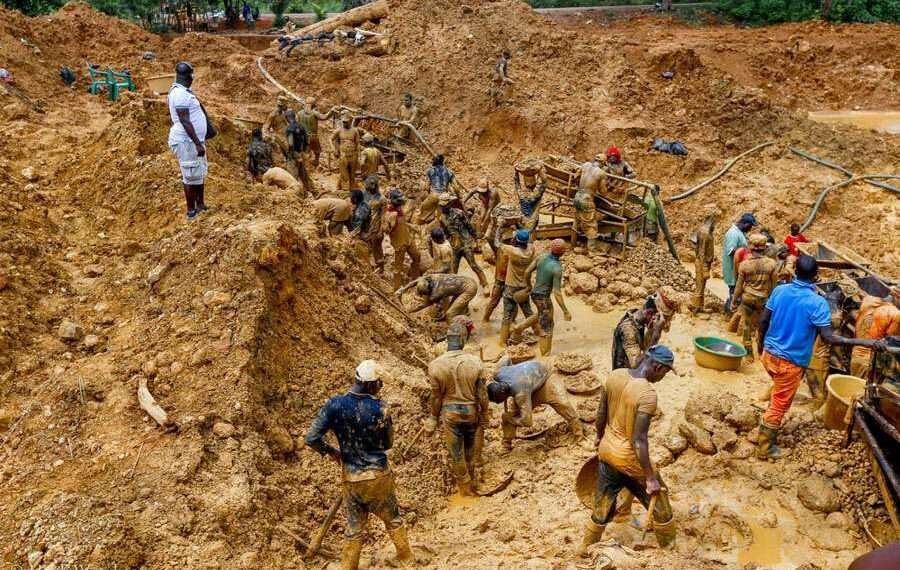Illegal mining, commonly known as galamsey, continues to spread beyond Ghana’s well-known mining regions, with devastating effects on the Bono Region.
The environmental destruction has worsened over the past five years, with reports indicating that some cashew farmers are selling their farmlands to illegal miners.
During a tour of some galamsey-affected areas, Bono Regional Minister Hon. Joseph Addae Akwaboah expressed shock at the extent of devastation caused by illegal mining.
The Bono Regional Security Council, led by Hon. Addae Akwaboah, visited several illegal mining sites where miners, mostly from southern Ghana, had moved into communities such as Branam, Surubokro, and Bandabuase with heavy-duty machines. These miners have dug boreholes deep into the dry forests to sustain their mining operations, further exacerbating environmental destruction.
The Minister, visibly alarmed by the damage, lamented the impact on the Tain River, saying;
“They have almost destroyed the Tain River. When we got to the bridge, you saw the kind of destruction that has been done under the Tain Bridge. We saw people doing illegal mining inside cashew farms, and they are doing it in secret. If you sit in Accra, you may think that illegal mining is not happening in this region, but they are moving in. You could see Chinese and our own people engaging in this illegal activity.”
Hon. Addae Akwaboah Bono Regional Minister
Unlike previous approaches that failed to curb illegal mining in the region, Hon. Addae Akwaboah pledged his unwavering commitment to fight the menace.
“This activity started not too long ago, but there was no political will to stop them. But we have the will, and we are going to work to stop this in the region.”
Hon. Addae Akwaboah Bono Regional Minister
The Minister also highlighted the threat posed to the Bui Dam, a critical national hydroelectric facility, warning that the increasing pollution of water bodies could have serious consequences for power generation in Ghana.
Warning to Chiefs and Illegal Miners

The Minister did not mince words when addressing traditional authorities who facilitate illegal mining by leasing land to miners.
“We know where they are, and we are coming after them. And those chiefs who have given lands to illegal miners—I am sounding this warning to all these chiefs—that when you are arrested, I will make sure that you are prosecuted to the end.”
“I am telling the Chinese and our people that so far as I remain the Bono Regional Minister, I am going to combat illegal mining. I am not going to allow them to work in this region.”
Hon. Addae Akwaboah Bono Regional Minister
Despite several warnings, it appears that illegal miners are undeterred. A journalist by the name Precious Semevoh, who accompanied the Minister on his tour, reported that illegal miners fled upon their arrival. She said;
“As we got to the site in Banda and parts of Wenchi, the illegal miners took to their heels. But just as we drove off, they returned to the site to continue their illegal business.”
Hon. Addae Akwaboah Bono Regional Minister
This underscores the boldness of illegal miners and the challenges in enforcing the law against them.
The devastation caused by illegal mining in the Bono Region is undeniable. The destruction of cashew farmlands, forests, and the Tain River is not just an environmental crisis but also a threat to the livelihoods of farmers and the sustainability of water resources in Ghana.
While the Bono Regional Minister’s strong stance against illegal mining is commendable, the situation on the ground suggests that mere warnings are not enough. Sustained law enforcement, community engagement, and political backing are necessary to eliminate galamsey activities in the region.
Without decisive and immediate action, illegal miners will continue to operate with impunity, further degrading the region’s natural resources.
The battle against illegal mining must go beyond rhetoric—it requires urgent enforcement and community cooperation to reclaim the land and protect Ghana’s future.
READ ALSO; Ghana Needs Economic Shock Absorbers, Not IMF Interventions- Prof. Gatsi




















